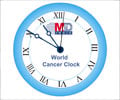In a recent study it was found that long-term cancer survivors take sick leave more often than their disease-free colleagues.

Torp and team observed the sick leave patterns of cancer survivors for five consecutive years after diagnosis. They were also interested in factors that might predict the amount of sick leave taken during the fifth year, including socio-demographic factors (education, family status, annual income, and occupation) and clinical factors (cancer type and severity).
They analyzed data from Norwegian population-based registries and the Cancer Registry of Norway for 2,008 adults who had been diagnosed with invasive cancer. The control group comprised 3,240 carefully matched 'healthy' individuals.
They found that the amount of sick leave taken among long-term cancer survivors was significantly higher compared to controls for all five years after diagnosis. A total of 75 percent of the long-term cancer survivors took sick leave within the first 12 months after their diagnosis. Over the following four years, 23 percent of men and 31 percent of women recovering from cancer took sick leave, compared to approximately 18 percent of men and 27 percent of women in the control group.
Interestingly, socio-demographic factors were more important predictors of sick leave than the type or severity of the cancer. Being single with children, having low education, working in the health and social care sector, or having taken sick leave the year before diagnosis predicted sick leave taken five years after diagnosis.
The authors conclude: "Employed long-term cancer survivors may struggle with health impairments or reduced work ability five years after diagnosis. A socioeconomic and work environmental perspective seems necessary for occupational rehabilitation and the health and safety of cancer survivors, in order to reduce the rate of sick leave in this group."
Advertisement














